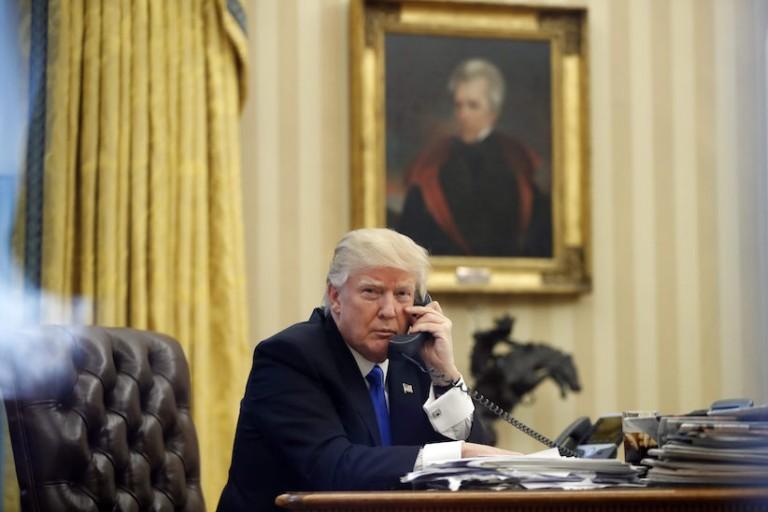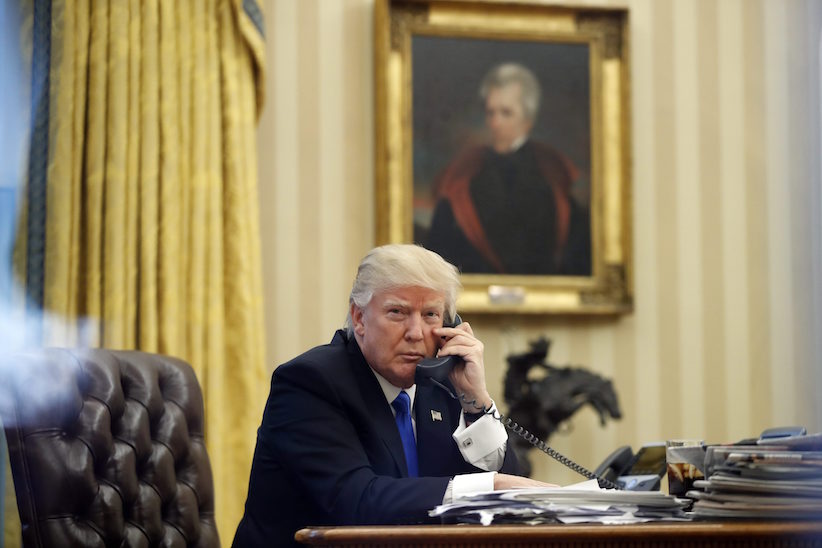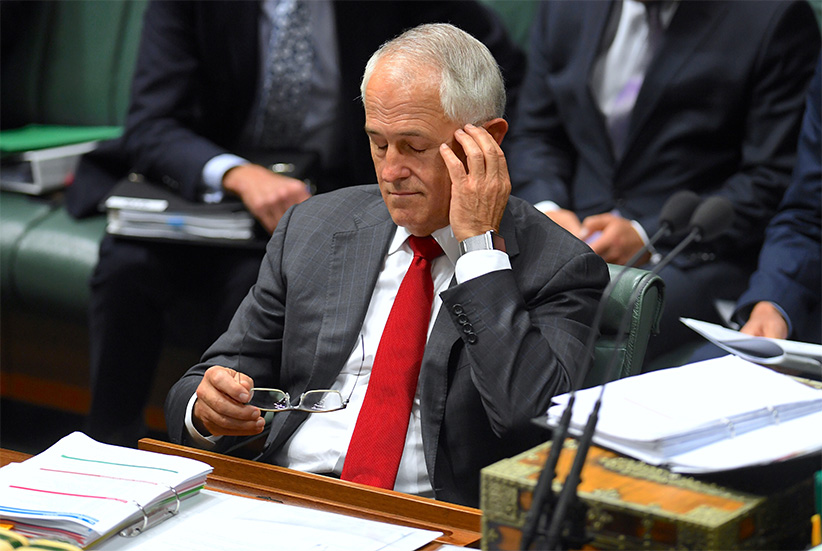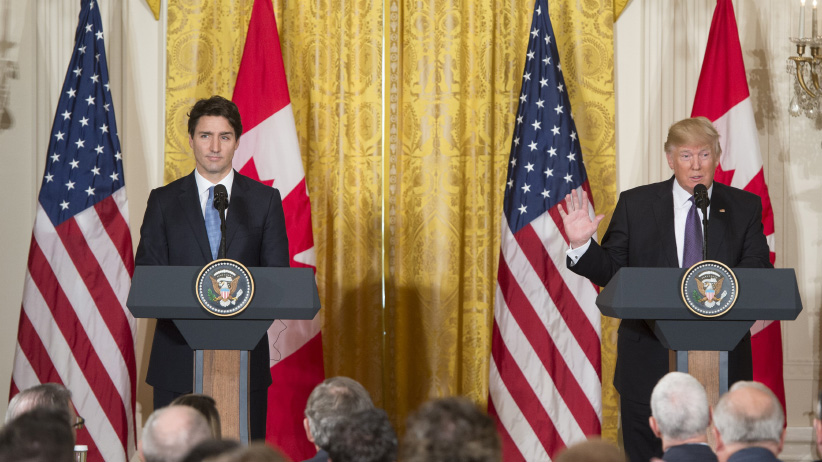Donald Trump’s phone-call leaks are a threat to America
Opinion: If world leaders can’t trust America when they’re on the phone with the President, what are they supposed to do?

President Donald Trump speaks on the phone with Prime Minister of Australia Malcolm Turnbull in the Oval Office of the White House, Saturday, Jan. 28, 2017 in Washington. (AP Photo/Alex Brandon)
Share

Andrew MacDougall is a London-based columnist and commentator. He was a director of communications to Stephen Harper.
The leader-to-leader phone call I’ll always remember from my time in Ottawa is the one where a G20 president asked Prime Minister Stephen Harper about the quality of the women in Toronto.
Suffice it to say the Privy Council Office didn’t include that tabloid tidbit in their readout of the call. Then again, PCO never included very much detail about any leader call—and that was entirely by design.
As President Donald Trump is now discovering after the Washington Post published full transcripts of his calls with Malcolm Turnbull of Australia and Enrique Peña Nieto of Mexico, having a verbatim record of your exchanges with counterparts in the public domain is an uncomfortable place to be.
The anti-Trump commentariat will delight in today’s news and the embarrassment it causes. But place me with the dearly departed Anthony Scaramucci on this one, at least figuratively: the White House needs to f–king kill the leakers who handed out this information. Transparency is important—but a threat to the privacy of these discreet conversations threatens America’s ability to play its traditional leading role in global affairs.
Let me explain. First and foremost, a call between two leaders is the most sensitive type of diplomacy conducted by nations. The principals don’t usually get on the phone to sort out the easy bits; they call each other at times of acute stress, or with a particular, often delicate, ask.
Even if, say, one country takes the decision to not help the other, it’s rare for that rejection to be made explicit in public communication, especially among allies. “The two leaders had a frank and honest exchange on (INSERT ISSUE HERE)” is usually code for “one told the other to get stuffed.” Here, diplomacy allows the saving of face, but also the freedom to speak one’s mind.
Other times, global diplomacy is like high school, where leaders call each other to whine about someone else. Imagine, if you will, Angela Merkel’s prep calls ahead of the recent G20 summit in Hamburg, where Trump was the known roadblock to agreement. Surely, there were airings of grievances about the president; it would have instead been boiled down to “the two leaders discussed the upcoming G20 Summit.”
No matter the subject, the public communications around these calls are really just marketing. Each side puts out their version of the call, highlighting the areas of concern most relevant to their populations. With friends, steps are taken to ensure no contradictory sentiments are released.
If two leaders can’t approach these conversations bluntly, with the full expectation their words will be kept private, they will hesitate to speak unvarnished truths or to make direct demands. This opens the world up to misunderstandings on important subjects. Who will want to call the United States now to have a candid chat on a tough issue? How effective can diplomacy be without this essential tool in its toolkit? If these leaks keep happening, America will lose even more influence than Trump is already throwing away.
Besides, the transcripts that were published don’t actually tell us anything new about this President and his personality. Transcript Trump is just as unfocused, uninformed, braggadocious, and crass as Twitter Trump. One can practically hear Turnbull speak in his four-year-old voice as he explains Australia’s approach to migration.
Canada even features briefly, with Trump telling the Mexican president that Canada “is no problem” with respect to the NAFTA renegotiation, and that the United States has a “very fair relationship with Canada.” You can bet Canadian diplomats have taken note and will be ready to throw the President’s words back in U.S. trade representative Robert Lighthizer’s face at the negotiating table.
The transcripts are also damaging to Trump politically. At one point in their conversation, Trump begs Peña Nieto not to go to the press with his demand that Mexico was refusing to pay for Trump’s vaunted border wall. “The press is going to go with that and I cannot live with that. You cannot say that to the press because I cannot negotiate under those circumstances,” he said. Some art of the deal. For a bully, Trump doesn’t seem to know how to use his presidential pulpit. Does Trump seriously think Peña Nieto is going to tie one hand behind his own back so the man who called his countrymen rapists and criminals can get better terms?
One can only imagine how Trump’s base is reacting to this supplicant version of their man, which is why we should expect a full-volume chant of “find the leakers” from Trump and his surrogates in the coming days. The fact that Trump has yet to tweet about the release of the transcripts suggests a serious pursuit of the leakers by new chief of staff John Kelly is under way.
But then, this leaky White House is Trump’s own fault. It’s the inevitable consequence of Trump running as an outsider in his own party and then pledging to drain the swamp; the swamp knows how to fight back. Trump has also encouraged staffers to grapple for power and influence inside his own administration, sending mixed messages about policy and employment certainties. Little wonder, then, that this ship has been full of holes.
Regardless, these phone calls need to remain private to be effective. After all, if anyone caught wind of the full details around that G20 leader’s remark to Stephen Harper, Canada’s place on the world stage would be badly damaged—and rightly so. Even if you loathe this particular president, these leaked transcripts are an assault against leaders’ base-level right to speak freely—and ultimately hurt the country, too.

